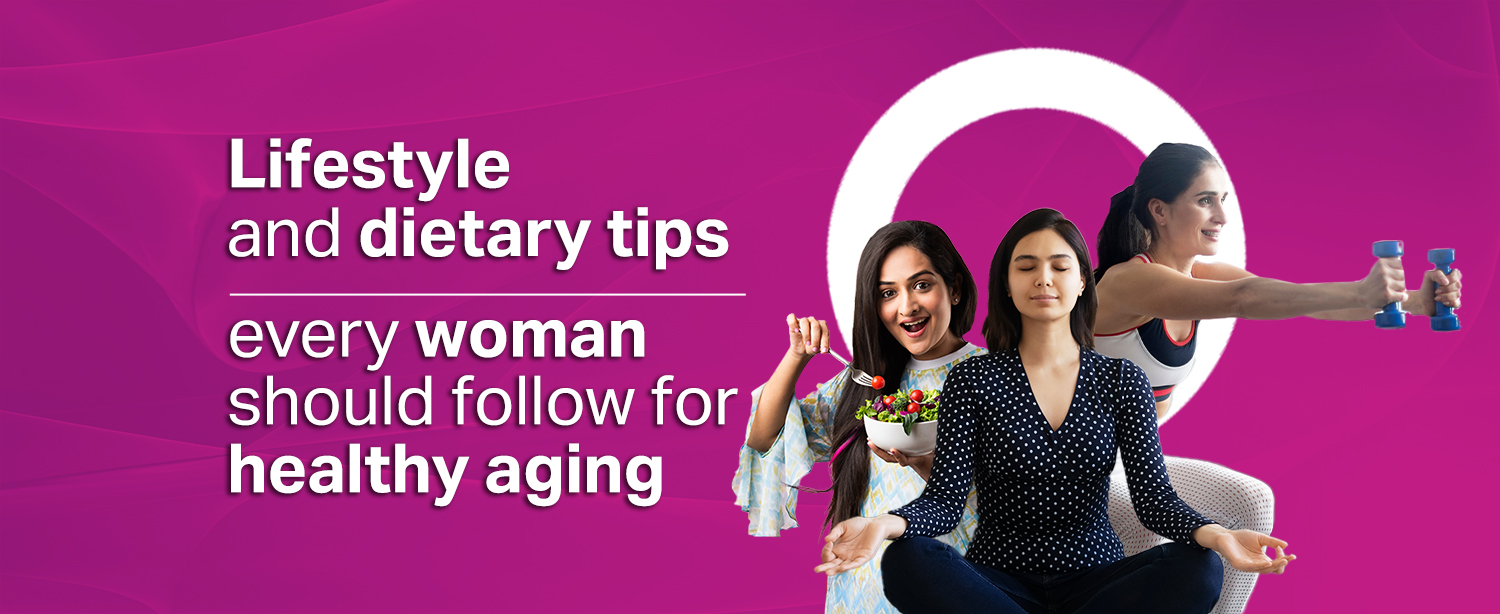Aging is a natural process that every woman experiences, but how you age largely depends on the lifestyle choices you make. While genetic factors play a role, your diet, physical activity, and overall lifestyle choices significantly impact your well-being in later years. Women often experience unique health challenges with age, including hormonal shifts, loss of bone density, and changes in metabolism. By adopting the right nutrition and exercise habits, women can maintain vitality, prevent chronic diseases, and improve overall quality of life.
Table of Contents
Healthy Aging in Women
It is not just about living longer but also about maintaining physical, mental, and emotional well-being. As women age, their bodies undergo significant changes, including muscle mass decline, bone density reduction, and joint stiffness. Without proper attention to nutrition and an active lifestyle, these changes can lead to osteoporosis, cardiovascular diseases, and mobility issues.
Importance of Nutrition for Older Women
Nutrient requirements change as a woman ages, and deficiencies can accelerate age-related decline. Here’s why proper nutrition is crucial:
- Supports bone health
Adequate intake of calcium and vitamin D helps prevent osteoporosis. - Maintains muscle mass
Protein-rich foods support muscle strength and mobility. - Boosts immunity
A diet rich in vitamins and antioxidants can help the body fight infections. - Enhances cognitive function
Omega-3 fatty acids and other brain-boosting nutrients support mental clarity and memory. - Promotes heart health
A balanced diet with healthy fats and fiber lowers the risk of cardiovascular diseases.
Nutrition Tips to Follow for Healthy Aging
- Increase Protein Intake
Women naturally lose muscle mass with age, but consuming enough protein can help slow this decline. Include lean meats, eggs, fish, dairy, legumes, and soy products in your diet. - Prioritize Bone-Strengthening Nutrients
Vitamin D and calcium are essential for bone health. Dairy products, leafy greens, fortified cereals, and fish like salmon are excellent sources. - Incorporate Omega-3 Fatty Acids
Found in fatty fish, walnuts, and flaxseeds, omega-3s reduce inflammation and support heart and brain health. - Stay Hydrated
Dehydration becomes a bigger risk with age. Ensure adequate water intake and consume hydrating foods like cucumbers, melons, and oranges. - Add Antioxidant-Rich Foods
Berries, nuts, dark chocolate, and green tea help combat oxidative stress and support skin and immune health. - Consume More Fiber
Whole grains, fruits, and vegetables help regulate digestion and prevent cardiovascular issues.
If dietary intake is insufficient, discuss multivitamins, calcium, vitamin D, and omega-3 supplements with your family doctor.
How Does Aging affect a Woman’s Body?
Aging brings several physiological changes in women, including:
- Loss of muscle mass
Women lose 5-8% of muscle mass per decade after 30, leading to weakness and reduced mobility. - Joint pain and stiffness
Cartilage loss can cause discomfort and increase the risk of arthritis. - Decreased bone density
Estrogen declines during menopause, leading to osteoporosis risk. - Slower metabolism
Weight gain is common due to metabolic slowdown and hormonal changes. - Changes in skin and hair
Collagen loss leads to wrinkles and reduced skin elasticity.
Exercise Tips to Follow for Healthy Aging
Physical activity is one of the best ways to maintain health and prevent age-related conditions. Women should aim for a balanced workout routine that includes:
- Strength training is recommended 2-3 times per week.
- Cardiovascular exercises must be performed regularly.
- Balance and flexibility workouts help improve overall mobility.
- Low-Impact workouts like swimming and water aerobics are recommended.
Healthy Lifestyle Changes for Women to adapt for Healthy Aging
Apart from diet and exercise, making lifestyle modifications can significantly impact the aging process. These include:
- Preventive care, such as mammograms, bone density tests, and lipid profile checks are advised.
- Aim for 7-9 hours of sleep each night.
- Practice meditation, deep breathing exercises, or mindfulness to manage stress effectively.
- Engage in community activities, family gatherings, or hobbies to maintain emotional well-being.
- Quit smoking and avoid alcohol intake.
- Keep your mind sharp with reading, puzzles, or learning new skills.
Aging gracefully is about making conscious choices that prioritize physical, mental, and emotional health. A combination of a nutrient-rich diet, regular physical activity, proper health screenings, and a positive mindset can ensure women stay strong and independent in their later years.Follow these recommended lifestyle and dietary changes to enjoy a fulfilling, healthy life at every stage. If you have any medical concerns, reach out to specialists in the field of gynaecology, orthopaedics and endocrinology at Kokilaben Dhirubhai Ambani Hospital, Mumbai for expert care. Please find below our website link for more details: https://www.kokilabenhospital.com/departments/clinical.html


